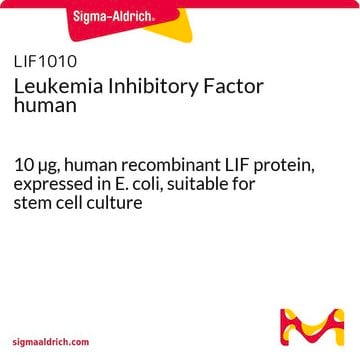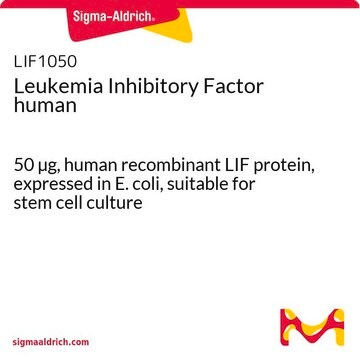SRP3316
LIF human
Animal-component free, recombinant, expressed in E. coli, ≥98% (SDS-PAGE), ≥98% (HPLC)
Synonym(s):
D factor, Differentiation-stimulating factor, Melanoma-derived LPL inhibitor (MLPLI)
Sign Into View Organizational & Contract Pricing
All Photos(1)
About This Item
UNSPSC Code:
12352202
NACRES:
NA.77
Recommended Products
General description
Leukemia inhibitory factor (LIF) is a secreted pleiotropic glycoprotein which is a member of the gp130 signaling of interleukin-6 (IL-6) family cytokines. This protein was originally identified as a protein that prevented the growth of a leukemic cell line.
Recombinant human LIF is a 19.6 kDa protein containing 180 amino acids residues including three disulfide bonds.
Recombinant human LIF is a 19.6 kDa protein containing 180 amino acids residues including three disulfide bonds.
Biochem/physiol Actions
Leukemia inhibitory factor (LIF) suppresses the differentiation of myoblasts, and inhibits the activation of caspase-3 and blocks the reduction in Bcl-xL (B-cell lymphoma-extra large) levels, thus, preventing doxorubicin-induced apoptosis. Along with transforming growth factor β2 (TGFβ2)/fibroblast growth factor 2 (FGF2), LIF regulates nephrogenesis. It facilitates tubular regeneration following acute kidney failure. It plays a crucial role in neuroprotective pathways induced by preconditioning-induced oxidative stress. LIF is capable of maintaining the totipotency of embryonic stem cells. It is also involved in controlling the differentiation of embryonic stem cells, hematopoietic and neuronal cells.
Physical form
Lyophilized with no additives
Reconstitution
Centrifuge the vial prior to opening. Reconstitute in water to a concentration of 0.1-1.0 mg/ml. Do not vortex. This solution can be stored at 2-8°C for up to 1 week. For extended storage, it is recommended to further dilute in a buffer containing a carrier protein (example 0.1% BSA) and store in working aliquots at -20°C to -80°C.
Storage Class Code
11 - Combustible Solids
WGK
WGK 3
Flash Point(F)
Not applicable
Flash Point(C)
Not applicable
Certificates of Analysis (COA)
Search for Certificates of Analysis (COA) by entering the products Lot/Batch Number. Lot and Batch Numbers can be found on a product’s label following the words ‘Lot’ or ‘Batch’.
Already Own This Product?
Find documentation for the products that you have recently purchased in the Document Library.
Protective effects of leukemia inhibitory factor against oxidative stress during high glucose-induced apoptosis in podocytes.
Xu J et al
Cell Stress & Chaperones, 17(4) (2012)
J F Moreau et al.
Nature, 336(6200), 690-692 (1988-12-15)
Leukaemia inhibitory factor (LIF) is a cytokine that induces macrophage differentiation of the murine M1 myeloid leukaemia cell line. We have isolated a cDNA clone encoding a novel human haemopoietic growth factor, human interleukin for DA cells (HILDA) that supports
Xiaoying Wang et al.
PloS one, 9(8), e106110-e106110 (2014-08-29)
Sertoli cells constitute the structural framework in testis and provide an immune-privileged environment for germ cells. Induced pluripotent stem cells (iPS cells) resemble embryonic stem cells (ES cells) and are generated from somatic cells by expression of specific reprogramming transcription
Yufang Ma et al.
Neuro-oncology, 17(4), 516-525 (2014-09-14)
RhoB is a member of the Rho small GTPase family that regulates cytoskeletal dynamics and vesicle trafficking. The RhoB homologs, RhoA and RhoC, have been shown to promote cancer progression and metastasis. In contrast, the functions of RhoB in human
Complex conserved organization of the mammalian leukemia inhibitory factor gene: regulated expression of intracellular and extracellular cytokines.
Haines BP et al
Journal of Immunology, 162(8), 4637-4646 (1999)
Articles
Leukemia Inhibitory Factor (LIF) is a stem cell growth factor used for the in vitro culture of pluripotent mouse embryonic stem cells (ES cells).
Our team of scientists has experience in all areas of research including Life Science, Material Science, Chemical Synthesis, Chromatography, Analytical and many others.
Contact Technical Service





